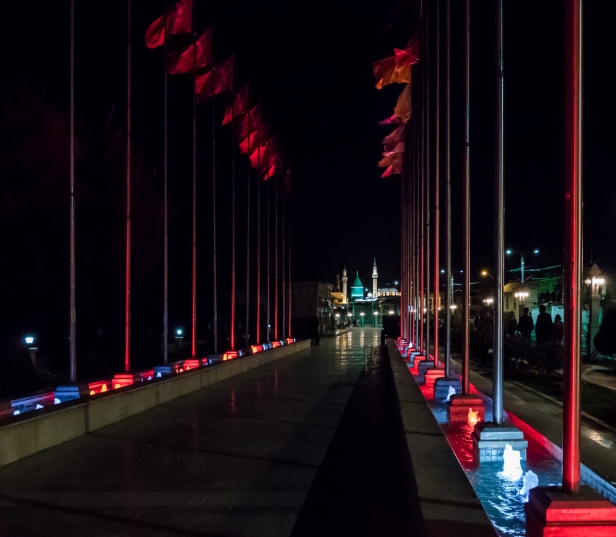
Out beyond ideas of wrongdoing
and rightdoing there is a field.
I’ll meet you there.
When the soul lies down in that grass
the world is too full to talk about.
― Rumi
12 Sept 2015. Our first afternoon in Konya. Sitting in our hotel room I spontaneously look Don in the eyes and say hello. In that moment I know clearly that we are just pretending to be bodies and that the connection between us is beyond this world and completely ineffable. Then I see that I have chosen an old body. I see it with impeccable clarity, and with that clarity I feel a huge roar of laughter inside me. I talk to Don about it. He connects with an unconscious belief that “travelling is hard on the body” hence all the little injuries he’s been having. My belief is that having an old body means being in pain, and I have been in a lot of pain, especially with walking all around Pamukkale for hours, and all over Izmir yesterday. The pain never ends in hips, knees, and neck. Trying to nap this afternoon I first connected with the laughter for having chosen an old body, then tears for the pain. I did manage to drift off for a bit, but then restless legs kicked in, literally, so no more sleep. Still, I hope connecting with these hidden beliefs and knowings will help alleviate the physical discomforts.
We went to Konya for Rumi of course. Rumi: that great Persian poet, scholar, theologian and mystic. Known as Mevlana, meaning master, his name is Jalāl ad-Dīn Muhammad Rūmī. He was born on the eastern edge of the Persian Empire, in what is now Afghanistan, in 1207. His spiritual teacher was Shams of Tabriz, a wandering wild holy man, who spent only two years with him after Rumi had settled in Konya, in what is now Turkey. Today Iran, Turkey and Afghanistan all claim him as their national poet.
After Rumi’s death in 1273 his son formed the Sufi order of the Whirling Dervishes in his honour, and we went to Konya to see their sacred dance or Sema. The Mevlevi Sema Ceremony is one of UNESCO’s Masterpieces of the Oral and Intangible Heritage of Humanity.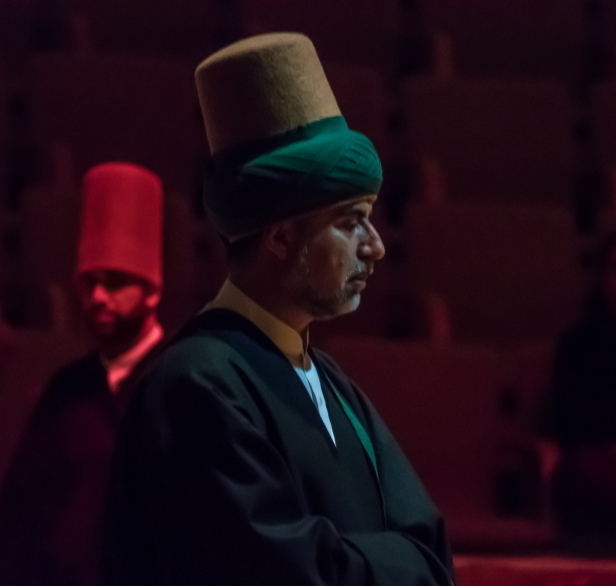
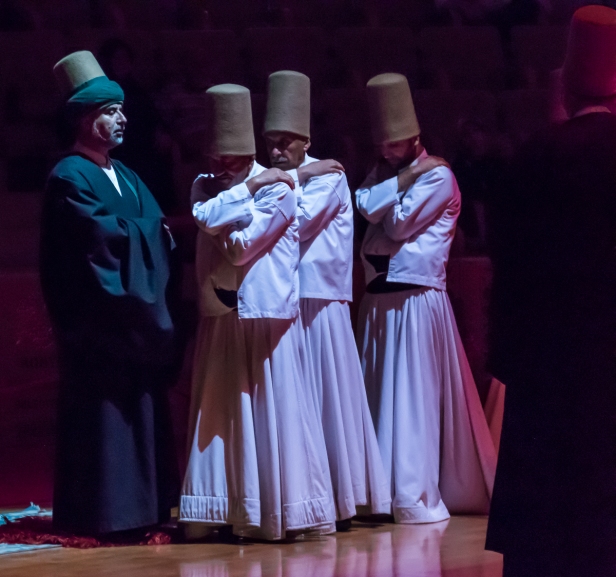
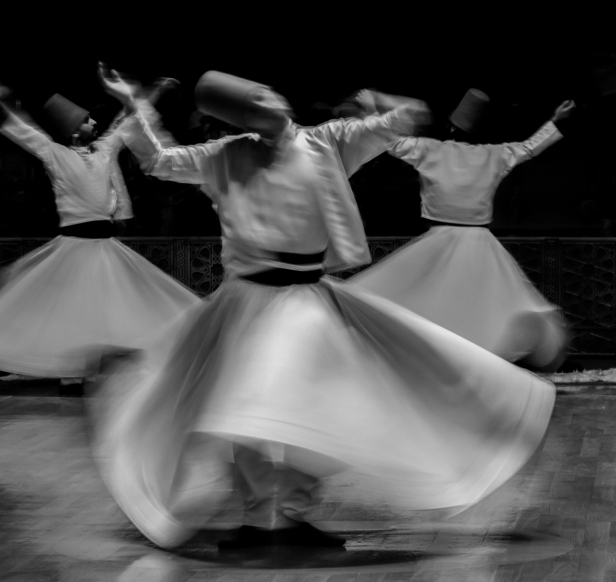
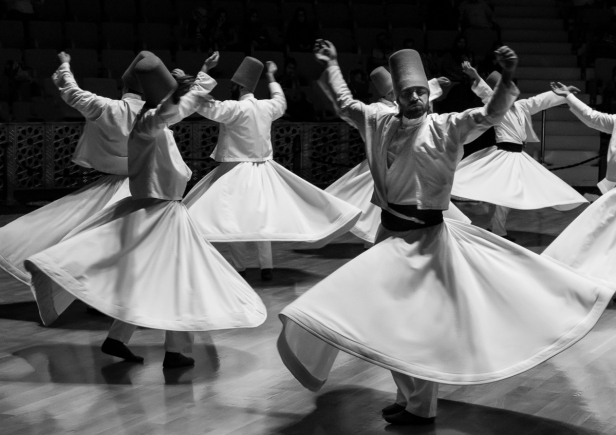
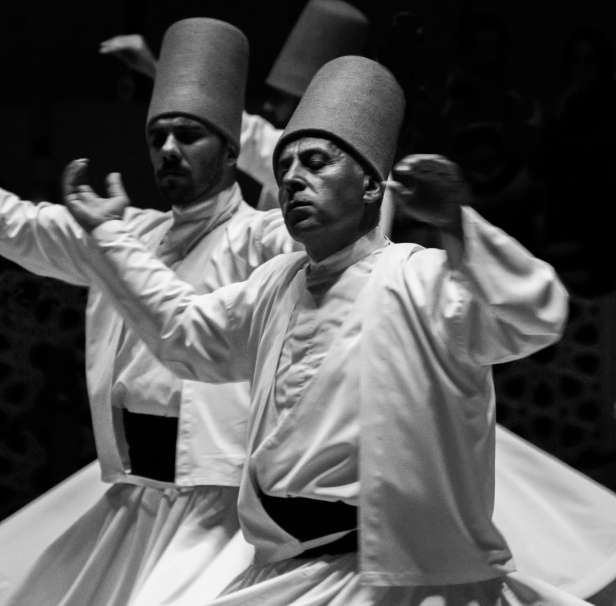
I am moved to tears by the love. I am also moved to tears that women are not included – there are no female dervishes. Like most religions, even the mystical branches of them, it is by men for men. The exclusion makes me both sad and angry. The “head” man seems very self-important. The dervishes whirl themselves into an ecstatic trance and then meditate, but women don’t get to do that. I feel as if I could write screeds about the injustices perpetrated against women and girls by men throughout the world and throughout history. Rumi would not have excluded women. I have this perhaps naïve idea that Rumi would have included everyone even though he was a nobleman raised in a deeply patriarchal society.
Come, come, whoever you are,
Wanderer, worshipper, lover of leaving – it doesn’t matter.
Ours is not a caravan of despair.
Even if you have broken your vows a thousand times
Come, yet again, come come.
– Rumi
Years ago I taught myself to spin. I read about it in a book. One day it occurred to me that if figure skaters could spin for several revolutions without being dizzy, to the point that they could then carry on with spectacular athletic moves across the ice, then I too could spin without getting dizzy. I longed to spin with the dervishes. Don discovered a group that met weekly in Istanbul and that included women. We planned to attend but we only had a week there and that week they cancelled their meeting due to it being a public holiday.
My soul is from elsewhere, I’m sure of that, and I intend to end up there.
― Rumi
13 Sept 2015. Today we visited the Mevlana Museum, the resting place of Rumi, and a museum of the Mevlana lineage.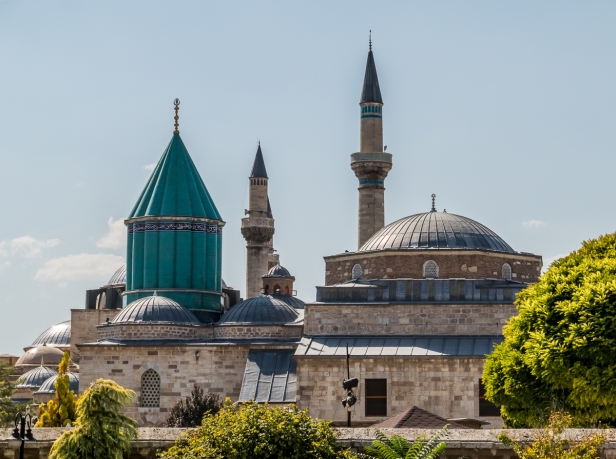
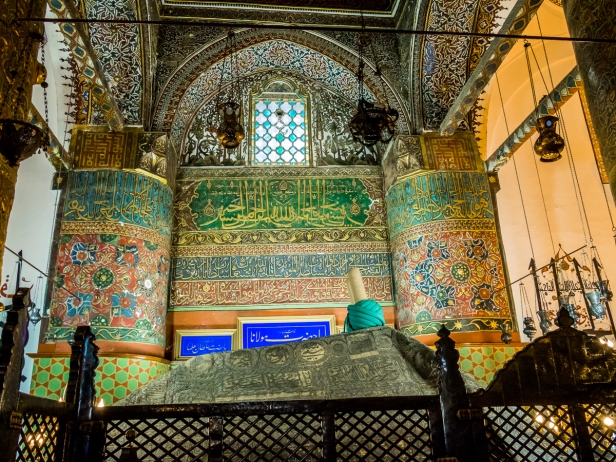
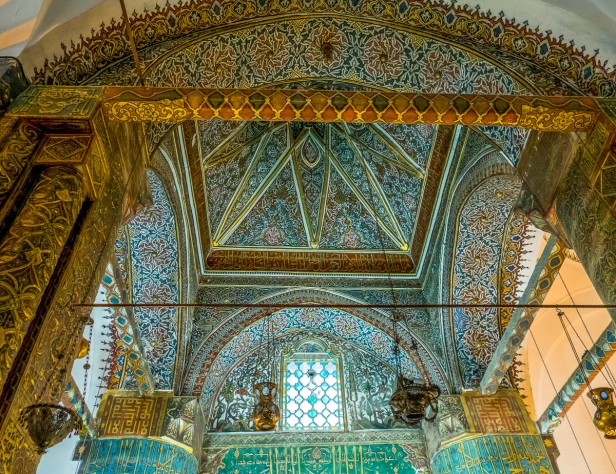
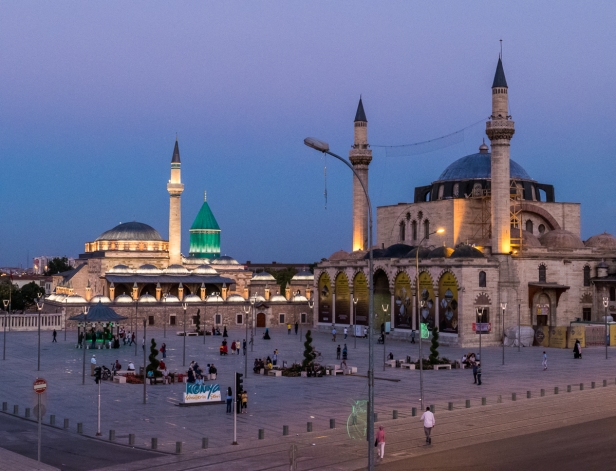
Once again I am saddened and angry by the exclusion of women in the Sufi tradition. And by Muslim women having to be covered from head to toe as if it is unacceptable for them to be seen in public. Meanwhile most men wear jeans and a t-shirt.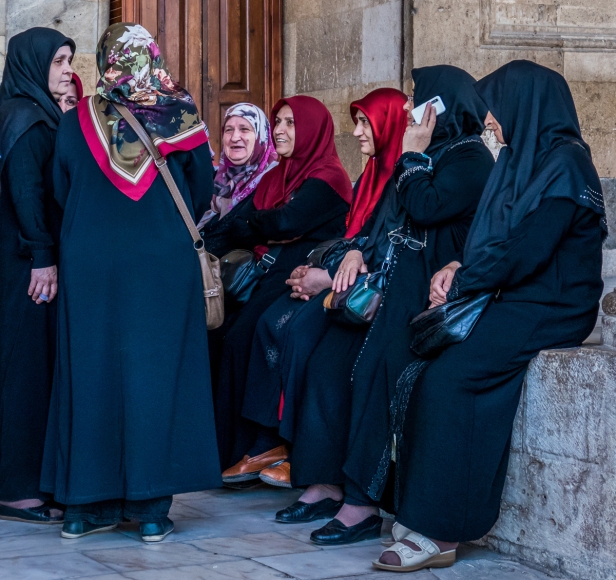
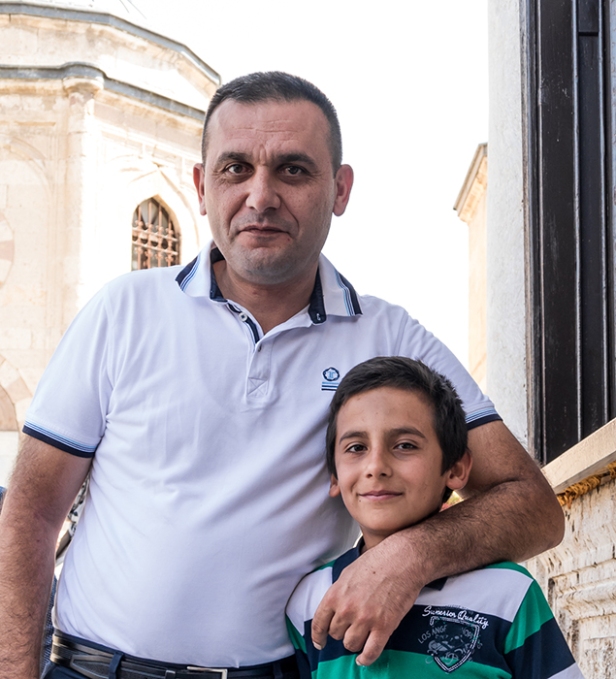
Mevlana’s prayers. Calligrapher – Silleli Osman el-Hamdi.
And now I don’t care about men or women or the state of the world. I am simply reverential about the exquisite creativity and splendor of this work. The beauty. The detail. The love. The presence and patience that went into creating it. Every page different. Every page perfection. I’m awed by such skill and devotion.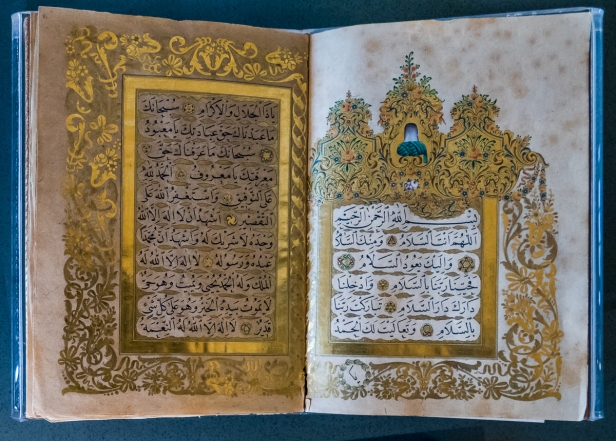
I was in a lot of pain again today – hips and knees – as usual it’s all about trying to move forward. I actually only need to think about what’s wanted in this moment. That’s it. If I could live from that truth – only thinking about, and doing, whatever is wanted in each moment, now, on the edge of time, perhaps all the pain would go away.
Yesterday I was clever, so I wanted to change the world. Today I am wise, so I am changing myself.
– Rumi
14 Sept 2015. We went exploring.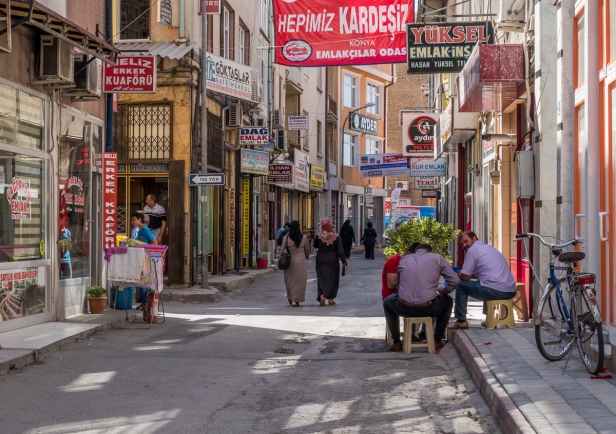
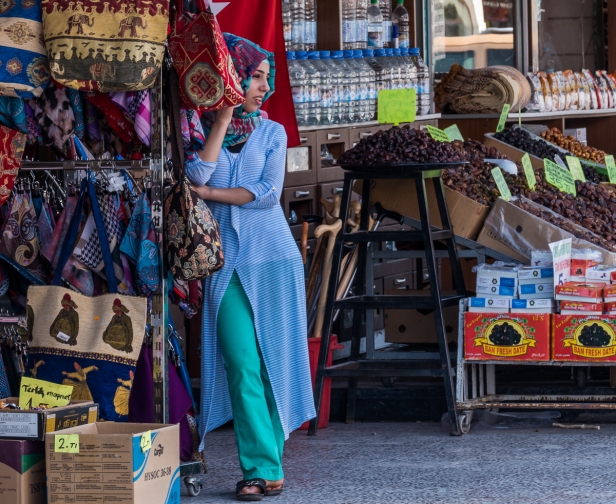
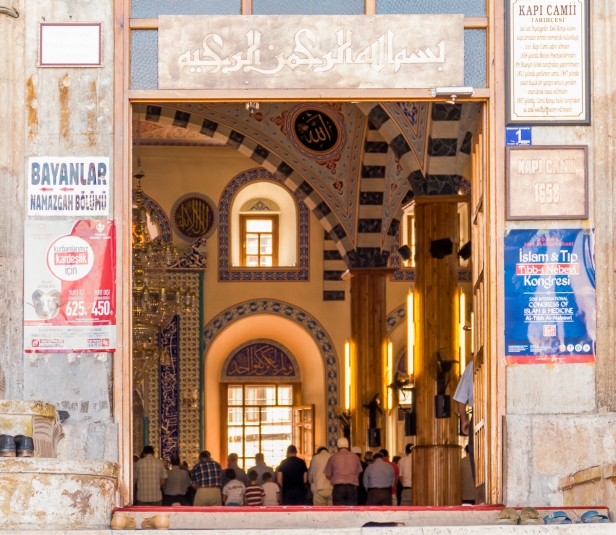
Konya is more conservative than other cities in Turkey and was once known as the “citadel of Islam”. For three hundred years, from the beginning of the last millennium, Konya was the capital of the Turkish Sultanate of Rum (Rome). This is the origin of Rumi’s name. Sitting on some steps outside a mosque, we watch the world go by.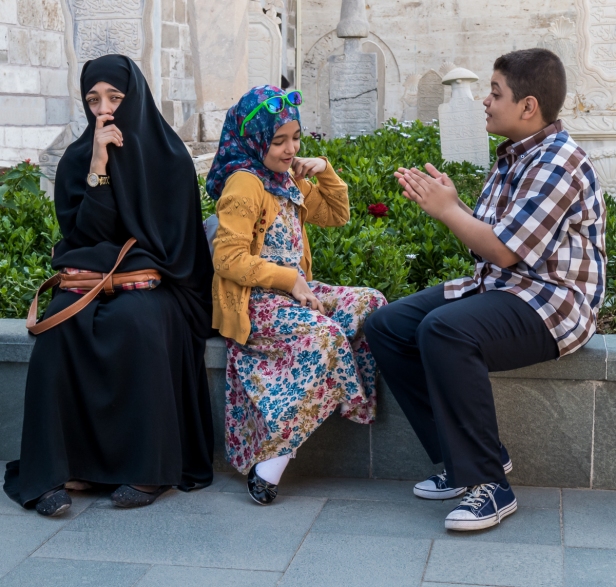
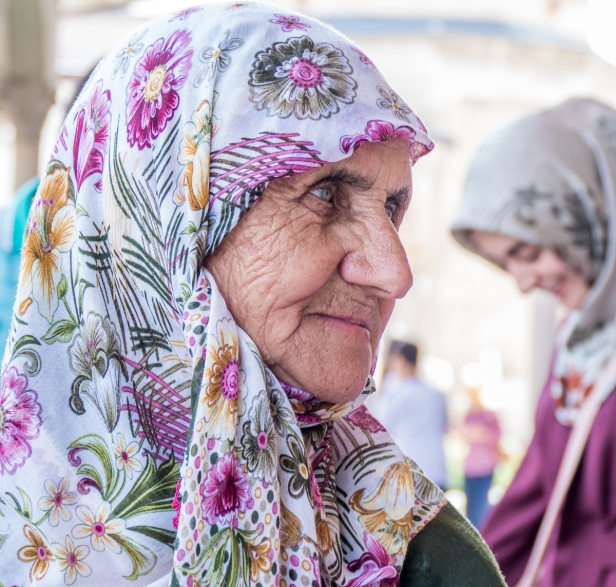
As we sit there Erkan comes to chat with us. His English is good. He’s a municipal policeman. He has no gun, only a radio and pepper spray. He deals with beggars and loiterers and anyone disturbing the peace.
Later, up in Alaadin Tepesi Park, Sabri approaches us and starts chatting. He takes us to the entrance of a wood and stone museum, which he said was not interesting but the entrance is a beautiful example of Selçuk architecture.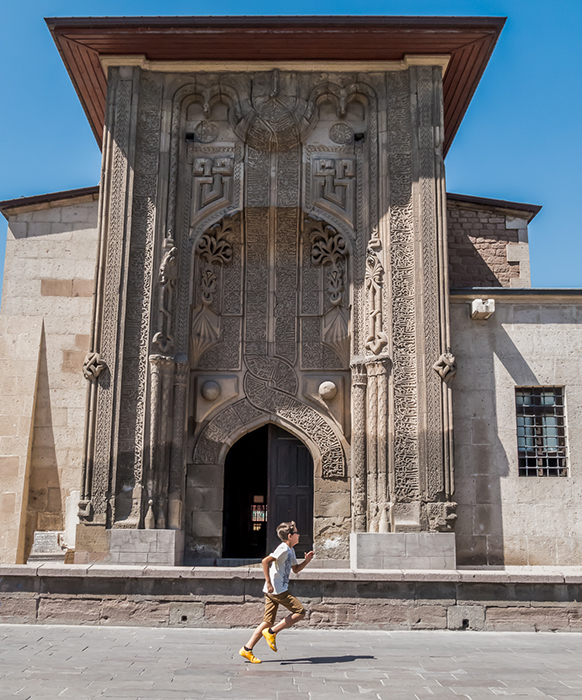
And he takes us to what used to be a school or university that still has beautiful eight-hundred-year-old tile work.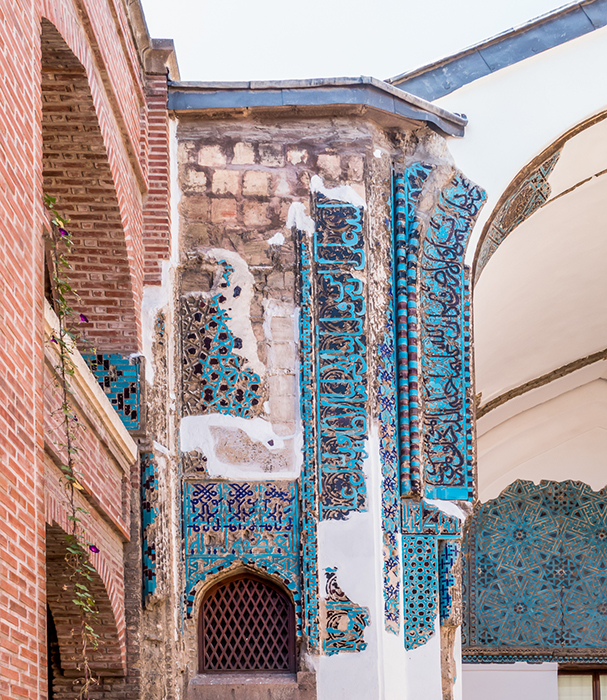
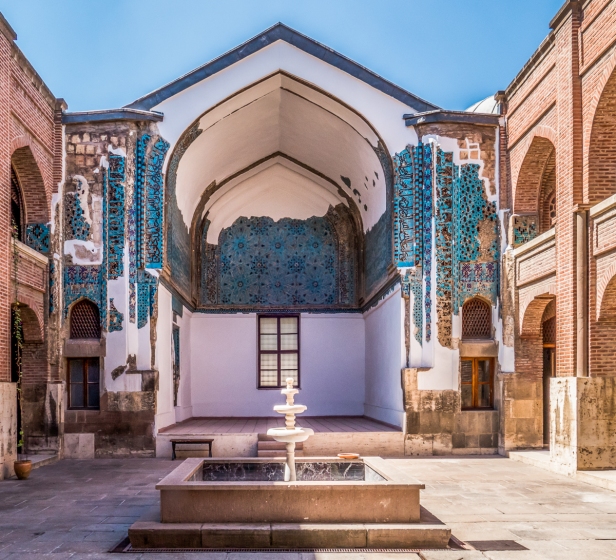
Suddenly a man approaches and introduces himself. His name is Kamil and he invites all three of us to his nearby bakery where he gives us iced tea and a plateful of delicious Arabian sweets and cookies.
We go to Iplikçi Mosque. There is a service happening so I had to go in with the women walled off from the main part and couldn’t see anything.
This is Kapu Mosque. This glorious space is where the men get to worship and pray and discuss Life and spirituality and the Koran.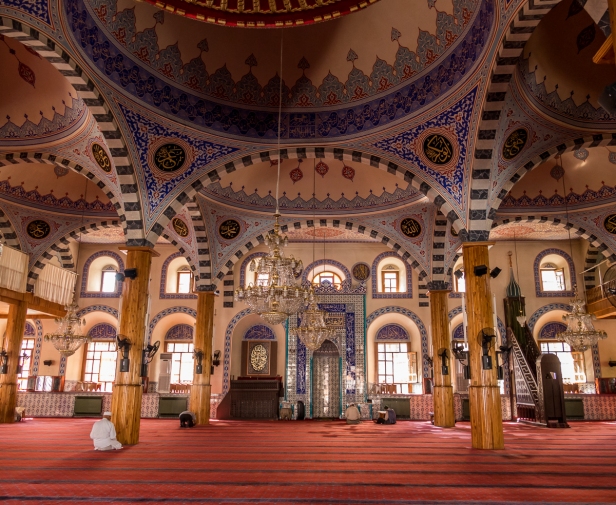
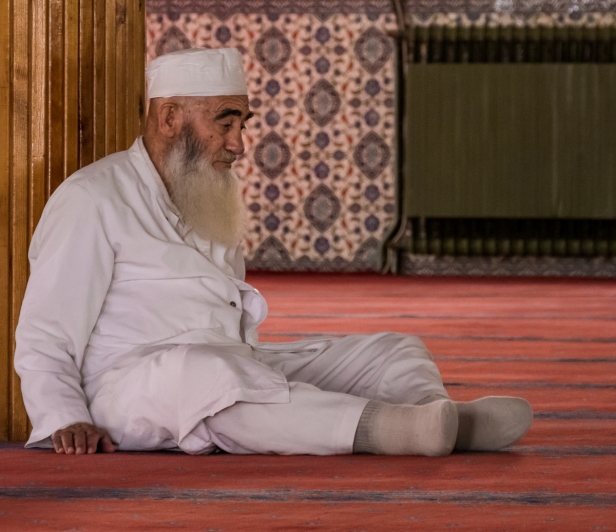
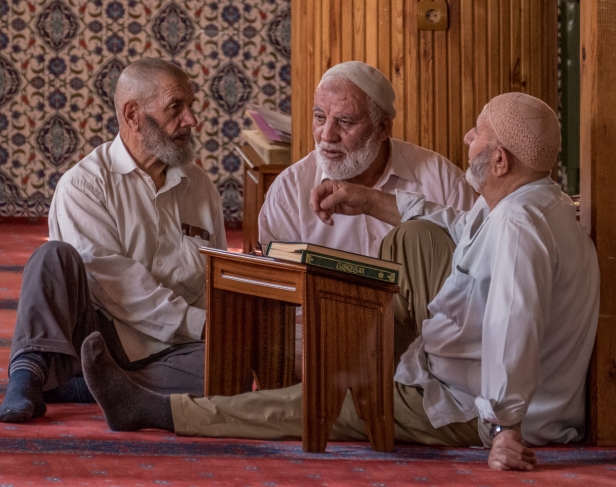
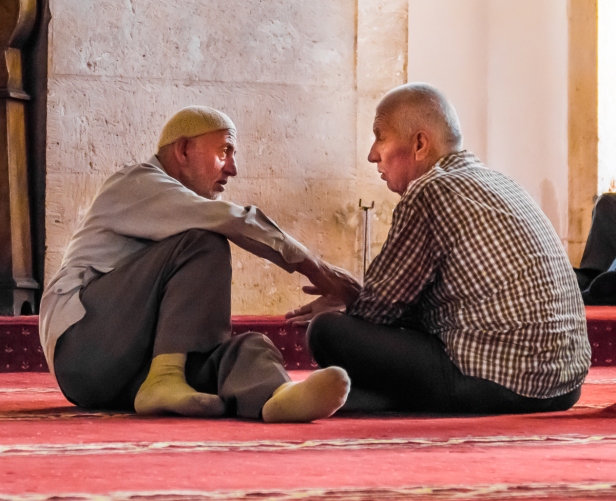
This long narrow plain and small room off to one side is the space allocated for women.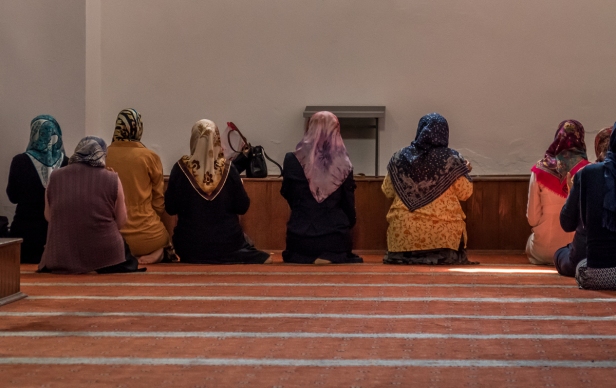
A true Lover doesn’t follow any one religion,
be sure of that.
Since in the religion of Love,
there is no irreverence or faith.
When in Love,
body, mind, heart and soul don’t even exist.
Become this,
fall in Love,
and you will not be separated again.
– Rumi
Islam has a strict etiquette of washing before prayer. Every mosque has its place for ablutions.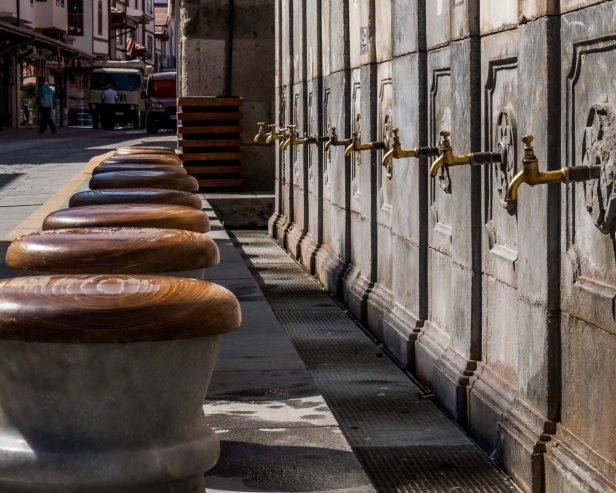
I’ve been in a lot of pain for six days now especially on the days we’ve done any amount of walking. I finally feel into it and cry, releasing some of the emotional pain:
The pain of loving
The pain of not loving
The pain of being no one
The pain of being someone
The pain of Life
The pain of believing I’m a body
The pain of living
The pain of dying
The pain of all women
The pain of all men
The pain of being human
The pain of forgetting
The pain of remembering
There doesn’t seem to be any solution at the moment except to keep feeling it at the emotional level as best I can.
Don’t grieve. Anything you lose comes round in another form.
― Rumi
15 Sept 2015. Don gave me a Reiki treatment on my knees. I also focused on being much more present with the inner body, and surrendered to the pain, so for the rest of the day walking was easier. We wandered for a while, photographing the people.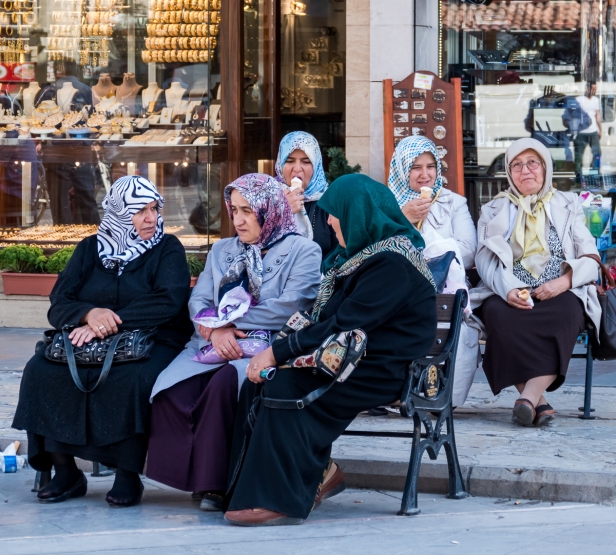
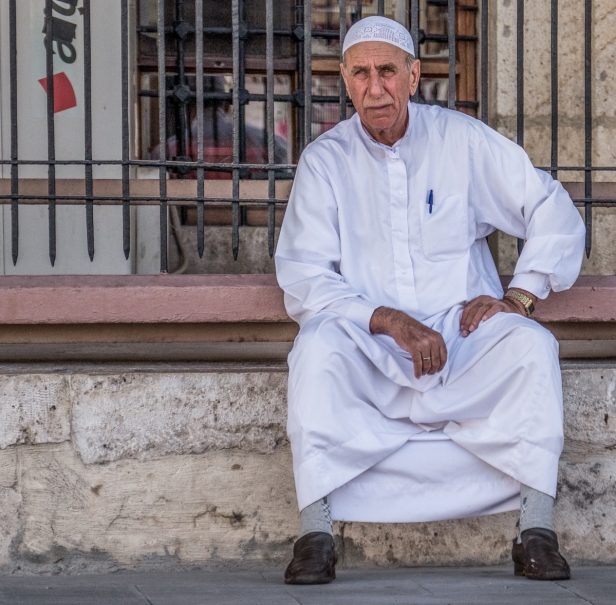
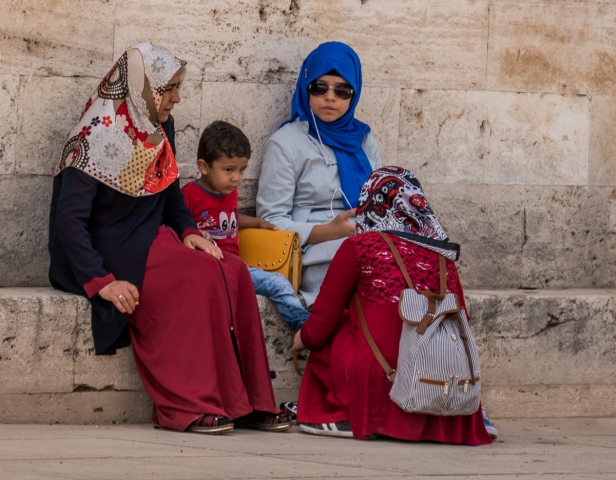
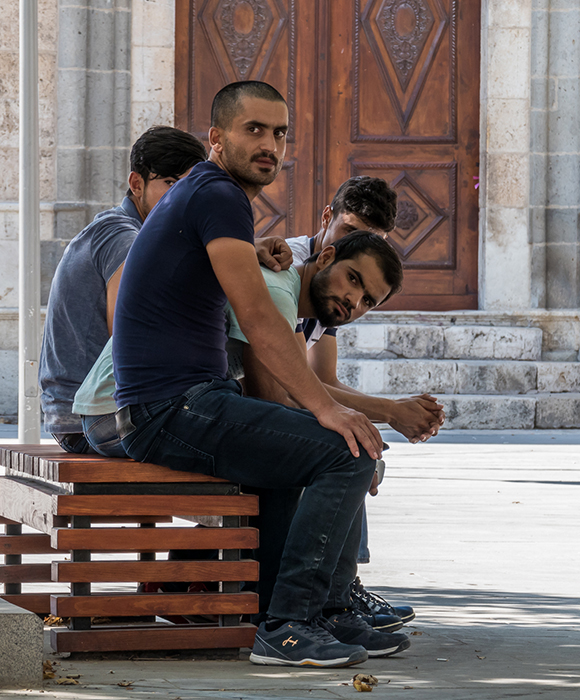
Dinner at Mevlani Sofrasi. We ate tiny rolled vine leaves stuffed with meat and slathered with minty garlicky yogurt, lamb that had been cooked in juices for five hours that melted in the mouth, a salad of diced tomato, cucumber and parsley with olive oil and lemon juice, and hot fresh bread. We finished with a traditional Konya dessert – a little like caramel though not as smooth, made with milk, sugar, and butter, drizzled with honey. We ate at this same restaurant four times while in Konya.
I’ve been aware in Turkey, and especially in Konya, how covered-up the woman are, about fifty percent of them anyway – frequently in long black robes and skullcaps and a scarf over the top in 35 (95) degree heat. It doesn’t seem right.
Dance, when you’re broken open. Dance, if you’ve torn the bandage off. Dance in the middle of the fighting. Dance in your blood. Dance when you’re perfectly free.
― Rumi
From Konya we travelled by bus to Goreme.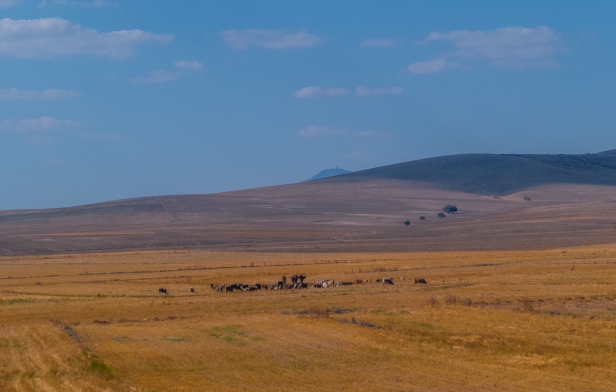
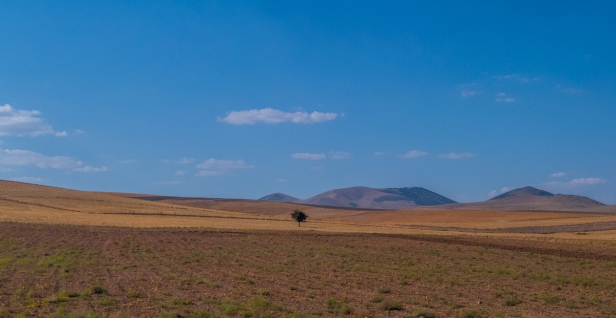
Next post: the fabulous and extraordinary landscape of Cappadocia.
All words and images by Alison Louise Armstrong unless otherwise noted
© Alison Louise Armstrong and Adventures in Wonderland – a pilgrimage of the heart, 2010-2016.

I have always been moved by Rumi, Alison, and you do him great justice. As always, your photography is superb. Thanks for this lovely post with its beauty, sadness, anger and pain. –Curt
LikeLiked by 1 person
Thanks so much Curt. Perhaps more than any other place we’ve been I was confronted with patriarchal traditions and institutionalized mysoginy in Turkey. For the most part when I travel I don’t judge how others live, I’m simply fascinated, so this was a new experience for me. It’s not surprising though, since it’s a more exaggerated form of the patriarchy and mysoginy found throughout the world. In Turkey for the first time it was really in my face. So yes, sad, and angry. Thank goodness for the glorious Rumi to help me keep things in perspective. Rumi is heart-rending – in a good way.
Alison
LikeLike
When prejudice is institutionalized in religion (regardless of which religion) it becomes even harder to fight, Alison. The fight goes on. Women, the world over, it seems to me, have aspirations that go beyond the strictures and prejudice of their cultures— as they should have. These are turbulent times. Let’s hope, when it all settles out (assuming it will), equal rights and respect between men and women will be one of the results. –Curt
LikeLiked by 1 person
Yes, it’s all religions, and I’ve long been perturbed by it. I think in some pockets of the world Christianity is as restrictive. Buddhism is perhaps more lenient, and Hinduism at least has female gods among the pantheon of thousands. I guess it was my first time where the strictures against women in Islam were so in my face. And I appreciate the turbulence – hopefully the dust will settle in all the right places 🙂
Alison
LikeLike
Hope so too, Alison. –Curt
LikeLiked by 1 person
Rumi, my 2nd favorite poet. So happy to have a look at his home and roots through you. Thank you!
Also enjoyed seeing all the colored and colorful patterns everywhere. I’ve come across many coloring pages that are referred to as Turkish patterns, Turkish tiles, and they’re not pages I’m drawn to color. But they look amazing in your photos. That Mevlana Museum!!
LikeLiked by 1 person
Thanks Kate. So who’s your first favourite poet? I would love to see you colour Turkish (or other) patterns – you such have an eye for colour harmony I bet they’d be beautiful. Yes, the museum was extraordinary – simply gorgeous. And I’ve only shown just one small part of it.
Alison
LikeLike
e.e. cummings!
But as I said, I haven’t been drawn to coloring the tile-ish patterns. Too repetitive for me (once you’ve colored one area, the rest of the page is often exactly the same pattern, repeated), and also I prefer to color bigger spaces (tile patterns tend to have very small spaces to color).
LikeLiked by 1 person
Alison, you capture the beauty, the past of long ago and some cruel unloving traditions that religion imposes. You make it all so immediate with your stunning images and connect,at least to me, with the ironic pain that so many of us ,older people bear daily.
Keep on with your dazzling crusade.-Ian
LikeLiked by 1 person
Thank you so much Ian. Travelling is such a mixed bag – joy, revelation, pain, excitement, shock. Everything comes to the surface. I felt confronted by my own issues being female in a patriarchal society in Turkey (and later also in Jordan and Egypt) – it was so much more in my face there than it is in my relatively easy western liberal life. And yes the pain of ageing – not so much fun, but I’m still hopeful I can find healing and have recently been introduced to a new healing modality that may help. In the meantime – on with the crusade!
Alison
LikeLike
Rumi gives us such wise words to help us on our journey. This is such a wonderful post. I’m so glad you continue to write and share all of this with us. Your photography inspires.
LikeLiked by 1 person
Thanks Angeline. I love Rumi’s wisdom – always helpful and healing. I can be all het up about something – the inequalities in patriarchal societies, or anything else – and I’ll read something by Rumi and am immediately transported into a deeper truth, a remembering of the ineffable, and peace arises from that place.
Alison
LikeLike
Allison, I really enjoy your posts, the passion with which you engage with your surroundings, the inclusion of your own challenges and your way of thinking about these challenges is inspiring. Thanks for including some of Rumi’s poems too, they are so apt. I am looking forward to your next post. By the way love your photos, which camera do you use?
LikeLiked by 1 person
Thank you so much goldenoldie. Rumi had such a beautiful and inviting way of expressing the ineffable that it’s hard not to be drawn in by his words. It’s teachers like Rumi that help me deal with the physical challenges. My camera is a Panasonic FZ1000. I mostly love it except that it’s not so good in low light, though I’ve figured out somewhat how to make the best of it. It has a built-in 24-400 zoom which is fabulous.
Alison
LikeLiked by 1 person
Thank you Alison and Don. Low light has been a problem for every camera I’ve had recently, the search is still on.
LikeLiked by 1 person
Sensor size is important. Full frame is best, but even micro four-thirds is good. Mine’s smaller than that. It’s always a compromise. I wanted a built-in zoom lens and various other features that the Panasonic has.
http://www.gizmag.com/camera-sensor-size-guide/26684/
Alison
LikeLike
Beautifully done and quite moving Alsion. Your photography and writing are exceptional.
LikeLiked by 1 person
Thanks Cindy. Your compliment made my day ❤
Alison
LikeLike
Alison, there is so much to mull over from this post that a quick comment wouldn’t do it justice. Thank you for sharing your photos and observations. I’ll be thinking about the complex issues of pain, aging and the cultural/religious issues that give us serious pause.
LikeLiked by 1 person
Thanks Michelle. Turkey was challenging for me in several ways – as you said: pain/aging, and cultural/religious issues. I was confronted by being female in a patriarchal world much more there than in my easy liberal western life. Thank goodness for Rumi to help me keep it in perspective.
Alison
LikeLike
What a wonderful journey! Congratulations for your award and thank you for sharing your passion, and let us wonder, and dream of far horizons
Thank you for rendering justice to Rumi, and Islam, and by showing a beautiful image, and another facet of Islam, and Moslems in their peaceful routine and daily ritual.
Thank you for all your worth really merits more than an award
LikeLiked by 1 person
Thank you so much Kalimelo. Turkey was a wonderful place to visit and to see a completely different culture. The people of Turkey, like people everywhere, live their lives as best they can in the circumstances that they are born into. I could see the ordinariness of their lives, their daily rituals, the same as people everywhere – pain, sorrow, joy, smiles, tears, laughter. At heart we’re all the same and the wonderful Rumi reminds us of that.
Alison
LikeLiked by 1 person
Yesterday I was clever, so I wanted to change the world. Today I am wise, so I am changing myself.
– Rumi
This quote, or verse from Rumi sums up all the philosophy, that resides in the work of Rumi, or Saadi, and many others, that encompasses the entire range of the Moslem world’s religious beliefs, and practices, understanding Rumi, Omar Khiyam, Aviroes, Ibn Arabi, Avicenna, Gibran Khalil Gibran, to cite just a few, it’s having a glimpse of the jewel, or the star that enlighten the world for more than a thousand years. Unfortunately, traditions and habits die hard, and with time, take over of the universal values that Humanity shares, that is, initially each religion came for and tended to install into the society. There is actually an Arab and Jewish common Music heritage that is still shared and played in the same orchestra members, that overcome all the difference, only by playing music together. Dialogue, through education of shared universal values, and trying to understand each other us help to inculcate respect for diverges identities, and the acceptance of the other, in his difference of thinking, and living, although is seems to us sometimes stranger to our own costumes.
Taking example of practicing yoga, or embracing Zen, and Budhism, it was unthinkable, and inaccessible, and moreover, unacceptable, for a preservative and traditional western society, just a century ago, thanks to the Beatles, and music it’s is now, a way of life, and a small change finally to the world in which we live with.
Armstrong said his famous quote, when he put his foot on the surface of the moon, ” That’s one small step for man, one giant leap for mankind.” Courtesy is contagious, and hospitality is the best.
And a smile, sometimes suffices
Thank you for taking time to read my reply
LikeLiked by 1 person
Mevlana Museum – what a place of magic (and green.) I commiserate with the pain that seems to come along as we age. Mine is not bad yet, but what a difference from just a year ago. Perhaps yours has eased up a bit. Are you able to slip into a bath every now and then?
LikeLiked by 1 person
Mevlana Museum was wonderful – so beautiful. The pain is the same. I’ve done huge amounts of emotional healing here in SMA, and I’m delighted to say we’re going to La Manzanilla in 2 weeks where we will have a private warm pool for nearly 2 months that I will slip into every day. I’m sure that will help. Also I’ve been told about a new healing modality that I’ll look into when I get back to Canada.
Alison
LikeLiked by 1 person
buen salud!
LikeLiked by 1 person
Fantastic. I am so enchanted by whirling dervishes. And I share your grievance with the place women are consigned in Islam. As for your pain, perhaps you need a break? By the time I finished my year of travel, I felt pretty physically torn down. Now at home I’m comparatively lazy and my body is thanking me for it. Also it probably helps that I’m back on my vitamin regimen. I’m guessing it’s inflammation causing your pain. Can you get tumeric there?
LikeLiked by 1 person
Thanks Jane. The dervishes were fabulous – it was really moving to see them right in from of us. Although there was an audience it was not a show for tourists, but a genuine sacred ritual. Ah yes, the patriarchal society – it’s the same the whole world over, just more exaggerated in some societies than in others. I felt confronted by it more in Turkey than I have elsewhere, probably because it was my first time in a predominantly Muslim country. We are resting in SMA – having a long break and doing lots of healing at the emotional level. We always carry vitamins and supplements with us so it’s not that. I’ll look into turmeric. Thanks for the suggestion.
Alison
LikeLike
Alison, this is a very moving post. I love the way you have woven Rumi through your narrative. The Mevlana looks exquisite. Maybe you need to check out a hammam!
LikeLiked by 1 person
Thanks Caroline. Konya was challenging, but as always there’s a deeper way to perceive and experience things, and Rumi certainly helps with that. I plan on including in a later post a more detailed piece about what women wear in Turkey – it’s a very wide range from barely there to fully tented. We looked into a hammam and decided against it – either way too expensive or possibly not clean enough. We did go to one in Jordan – it was fabulous! I love being in warm water. We’re going to La Manzanilla in 2 weeks where we will have a private pool. I’ll be in it every day for 2 months! I’m sure it will help.
Alison
LikeLike
Spellbinding mix of Rumi, pictures, and prose. Well done.
LikeLiked by 1 person
Thank you so much Dave. I put off writing this post for quite a while because I didn’t know where to start, but then I looked at my journal and realized most of it was already written, I just had to conceive of a new way of putting a post together. I’m glad you enjoyed it.
Alison
LikeLike
Yep. So much it deserved a reread. I was also taken aback by the separation of sexes, both physically and via clothing when I encountered it in Tangier. But their women seem to accept it. Cultural norms, I guess.
A question: I’m always nervous about photographing natives, or people in general. Do you ask permission? Shoot surreptitiously? You’ve gotten some good shots.
LikeLiked by 1 person
I sometimes ask permission (like the posed shot of the man and his son near the beginning of the post) and I sometimes shoot surreptitiously depending on where I am. I tend to like shooting surreptitiously more since it’s really the only way to get candid shots. I have a 24-400 zoom lens.
Alison
LikeLike
Enchanting post,Alison.” When you do things from your soul,you feel a river moving in you,a joy-Rumi”
LikeLiked by 1 person
Thank you Sidran. Rumi is wonderful. I think his soul is running through this post. I hope so anyway.
Alison
LikeLiked by 1 person
An extraordinary post, Alison. From that wonderful opening photo and the remarkable quote that goes with it, I thought you were going on to discuss the current, terrible situation and violence in Turkey. I enjoyed your direction (but not your pain 😦 ) much more. 🙂 The photos you capture of people and places bring them to life. What a man was Rumi! I would love to see that museum.
It’s a strange religion that shunts women to one side, isn’t it (shared by Judaism). We’re used to being equal partners now in the west so I understand your indignation. Harder to understand the equanimity with which the ladies accept it. And yet, they look happy enough. That old lady in the flowered headscarf has the loveliest face. Maybe acceptance is key? And no responsibility presumably. Those old guys sitting about in their socks make me smile. They’re probably discussing their aches and pains, Alison, rather than the affairs of the world. 🙂
LikeLiked by 1 person
Thank you so much Jo. I try very much to avoid the news of what’s going on in the world, but not completely. I do know there was a recent bomb attack in Ankara, and of course the border troubles with Syria. We stayed well away from eastern Turkey for that reason though apparently there is much to see there. I try not to dwell on the pain of the world, though obviously haven’t been able to avoid it on a personal level. It’s the same thing I think. We are all connected. Rumi helps me remember a bigger perspective. It is hard for me to accept that half the population is shunted off to one side by virtue of gender, though I do agree acceptance is the key to inner peace for everything in life. I suppose they do look happy enough but I imagine they are like people everywhere – a broad range from acceptance to inner seething and resistance. I do love watching people in their familiar home environment – like the guys in the mosque. They probably *were* talking about their aches and pains! In the end we’re all the same – we just want what we need to survive and to raise our families in peace.
Alison
LikeLiked by 1 person
I hope your physical woes are diminishing, Alison.
I really appreciate your observations of women’s oppression. It is a source of daily outrage for me and I could right an entire essay on the previous comment that “they look happy enough”. Well, not here and now, in any case. If I allowed my outrage to persist, it would consume me, so oftentimes I just have to let it go. And do what I can to change it, in my own small way.
LikeLiked by 1 person
Thanks Gayle. Sad to say my aches and pains are still constant visitors that I’m trying very hard to welcome with respect instead of just wishing they would go away. I know they are messengers but sometimes it’s hard to hear them. Acceptance. I’m not quite there yet and still hopeful that two months with a pool and being able to swim every day will help.We go to La Manzanilla at the beginning of April. Also I’ll be looking into Cold Laser when we get back to Van at the end of May. I’ve heard it can be very affective.
If I allowed my outrage to persist it would consume me too, and has at times. Then I read Rumi, or something like it and come back to better equanimity. And yes we must all do whatever we can about it, no matter how small it is. Even our language is patriarchal and I find myself telling people it’s not mankind, it’s humankind. In a very subtle but powerful way just the use of the word mankind perpetuates the myth that the human race really only consists of men, and women are just an adjunct. And history! What about herstory?!
Alison
LikeLike
Such an evocative title, Alison. It’s ironic to compare the beautiful words of Rumi and his deep understanding of the human condition and see the exclusion of women in worship and society… Loved your photos of the people and spent a few moments trying to imagine what they could be talking about. It helps me relate much more to the foreignness of the religion and culture when I think of them discussing their families and hopes for their children or worries about parents. Lovely post! Anita
LikeLiked by 1 person
Thanks Anita. I would imagine, like you, that they are discussing their families, and all the ordinary everyday things of life. I also imagine that most of the women accept their place in life. Until they don’t. I’m suddenly reminded of the movie “Sufragette” about the struggle for women to get the vote in England, in the 1920’s I think it was. Not that long ago but a good example of women saying enough is enough and being willing to go to gaol, and also promote violence, in order to be heard and to get equality. Still not there. And yes, ironic to compare the beautiful words and teachings of Rumi with the marginalization of women. I keep asking why. Why is it this way – throughout the world and throughout history. Do men really find us so very threatening that all societies are organized to control us and to keep us subservient? It boggles the mind really. Thank goodness for Rumi and other teachers like him – they help me retain equanimity. It is what it is. And I say that knowing I am one of the most privileged women in the world.
Alison
LikeLike
Wow! Every picture, one pf perfection and every word, one of devotion! How amazing is this post!!!! I’m very glad that I can see the world through your eyes 🙂 yes, it pains me too that Muslim women have to cover themselves like that – all women want to feel and look beautiful and to forbid that is not exactly a good thing! Also, them being excluded from mosques is something I have never understood. i don’t see the need for women and men praying separately. I disagree with that philosophy entirely.
LikeLiked by 1 person
Thank you so much Aishwarya. It’s lovely to hear that I’ve connected in some way. It was challenging for me in Turkey. It’s the first time I’ve been in a Muslim country and seen it first hand, and Turkey is one of the most liberal Muslim countries. Such a contradiction – the teachings of Rumi and the separation of women. I don’t see things in black and white – Life always has shades of grey in every circumstance, so although I see the surface separation and the cultural propriety of women having to cover themselves from head to foot, I can’t outright condemn it even though I know I’d hate it if I lived in a society where that was considered the norm..
Alison
LikeLiked by 1 person
Yes I agree. Here in India there are a fair number of Muslims and while several of them are orthodox and insist on their women covering themselves, several of them are free spirited and accommodating. And that’s very encouraging 🙂
LikeLiked by 1 person
Absolutely sensational Alison! BRAVO! What a beautiful story with such amazing photos and love love love the Rumi quotes. I had to share on my FB page. Oh how I want to go to Turkey!
LikeLiked by 1 person
Thank you so much Nicole. Rumi is a great favourite of ours so of course we had to go to Konya, his home for so long, and to see the dervishes. Thank you for sharing. I hope you get to Turkey one day!
Alison
LikeLiked by 1 person
I just adores this post. So beautiful.
LikeLiked by 1 person
Have you considered, Alison, that the pain in knee and hip is not about moving forward, but about NOT moving forward? An invitation to be still, stay put, rest, etc.? This might be a moot suggestion, because I imagine that your stay in San Miguel d”Allende is about all of that, and I also seem to remember that you found a solution there, at least for the physical part of it, right?
Your post about Konya brought back fond memories, we were there about twenty years ago, and, like you, went to pay homage to Rumi, one of the most astounding poets and wise men ever.
How are things in San Miguel d”Allende? Anythiing “juicing” you right now? 🙂
Greetings,
Tanya
LikeLiked by 1 person
I had *not* considered that the pain in my hips was about not moving, but it’s certainly forced that on me 🙂
Yes I am resting resting resting here in SMA, and seeing two wonderful healers who have helped me face and heal some very old deep issues that prevented me from moving freely. I’m sincerely hoping that physical healing will follow! I’ve also been told about Cold Laser which I’ll investigate when we return to Vancouver. Don has just gone out this minute to buy me some turmeric capsules.
The Whirling Dervishes were definitely a highlight of Turkey – what a beautiful evening it was. Apart from my dismay about the dress requirements for women, which was most noticeable in Konya, and the disappointment at Pamukkale, Turkey was quite wonderful.
I’m mildly juiced by the street art here in SMA and may do a post soon on dragons, which feature prominently. I don’t go out much. SMA has been, and continues to be all about healing and resting. Soon we go to La Manzanilla. If our last stay there is any indication I expect the private pool there to be nourishing and healing.
Alison
LikeLike
I send you my best wishes for healing and resting on all levels of your being.
Tanya
LikeLiked by 1 person
Hope all your pains are gone by now:), and you feel younger in body&soul! Very sad to see such discrimination still exist in our century.. I was always wondering how female tourists are treated in this kind of countries? Must be very frustrating.. Thank you for sharing such exquisite pictures and experiences! All the best Alison!
LikeLiked by 1 person
Thanks Christie. Sad to say my pains have not all gone yet, but I am hopeful I’ll find solutions soon. I’ve been doing a lot of healing at deep emotional levels and I expect that to eventually translate into physical healing.
While travelling in Turkey, Jordan and Egypt I always wore long loose pants, and long-sleeved loose tops and had no problems at all. And in all three countries at the major tourist sites anything goes. There were women in very skimpy clothes and it didn’t seem to be a problem. Konya is definitely more conservative than anywhere else we went in Turkey.
Alison
LikeLike
Best wishes Alison, hope to hear new solutions worked out! Christie
LikeLiked by 1 person
I have seen Rumi quoted before, many times. But your post here is the first one that’s made me really want to read his work. Is there anywhere in particular I ought to start? Or just dive in to whatever I can get my hands of his first?
Tumeric has been brought up before by my natural/organic/essential oils friends (and it seems one acquires a lot of those kinds of friends in the Pacific Northwest!) Hopefully it will help.
Having gone through a much less intense experience in very traditionally Catholic churches, I can appreciate what you wrote about the separate of the genders. I am glad you were able to share what you feel, and to be honest about it.
LikeLiked by 1 person
I’d say with Rumi just dive in. Google him and you’ll find many sites with dozens of his poems – he wrote 70,000!
This is a good site if you want learn a bit more about him:
http://www.rumi.net
That’s one of the reasons we love the Pacific Northwest! 🙂
Turkey was challenging for me seeing the separation of women. Maybe they’re happy, maybe they’re not. For me that’s not the point. So yeah, I couldn’t do this post without saying how I felt.
Alison
LikeLike
This is a beautiful post, Alison. One of my favorites. This also has some of the best photos I’ve seen on your blog. The third dervish photo really captures the motion and energy, and the old woman with the young woman in the background out of focus is superb. I also really like the girl with the headscarf at the market, and the photo two below it with the woman in black and the boy and girl.
I will have to read more about Rumi. His quotes are beautiful and brilliant.
LikeLiked by 1 person
Thanks Jeff. I didn’t know how to write it and then realized it was already mostly written in my journal notes. The third dervish photo is my favourite too, and the old woman, and the girl at the market. The two latter were just a couple of those serendipitous moments when everything aligned. The fourth one you mentioned also I guess. I didn’t even know I’d captured such an expression on the woman in black’s face. I love to photograph the people wherever we go and am always looking for opportunities to capture them spontaneously. Posed is okay, but when when they’re unconscious and you can capture a moment it’s better.
Rumi is wonderful. Just google him and there’ll be many sites with his poems. He wrote 70,000!
Alison
LikeLike
Beautiful post Alison, thank you! the words draw me in, and your photos…. ohhhh so lovely 🙂 Like someone else remarked, the portraits are stunning, how do you get them? I always feel if I’m sneaky about it, I can’t get close enough, and then I feel it’s not quite right if I don’t ask permission, but then even if permission is given, people are less natural…. such a dilemma! Turkey is on my list, haven’t been yet, it appeals to me so much – architecture, food, lifestyle. But the restrictions on women are certainly a challenge.
I hope you manage to find a way round the pain soon. I do think that travelling is hard on the body. I know I need lots of down time, and try to convince myself not to feel “guilty” about not going out and “seeing things”!!
Beautiful post, thank you again 🙂
LikeLiked by 1 person
Thank you so much danilam. I’m glad you enjoyed the post. I do sometimes ask permission to photograph, but mostly I do it surreptitiously. If you ask you get posing rather than capturing a natural moment. I have a 24-400 zoom lens which helps. Turkey is definitely worth visiting, and I had no problems at all. They don’t put any strictures on tourist women. If you go to the beaches most people are wearing next to nothing. Anywhere else you’re fine with your shoulders covered and 3/4 length pants.
We do tend to travel slowly because we need down time, and of course we have no reason to rush. I too, in the past, have had to convince myself not to feel guilty if I’m choosing to rest rather than sightseeing, but not anymore. I rest when I need to. This whole time in SMA has been about rest – because I had no choice. I want my body back!
Alison
LikeLike
This is an amazing post, thank you so much. I really like your great people pictures, your personal engagement, and the fact that you have introduced me to something completely new (the poetry of Rumi). Can’t ask for more, it has really increased the quality of my day.
I hope your pain is easing – this getting older thing is not for the faint-hearted is it?
LikeLiked by 1 person
Thanks so much Annie. I do enjoy photographing people, especially when I can capture a ‘moment’. Rumi is wonderful isn’t he?!
I started back at yoga and found out the hard way it’s too soon. So more resting for me.
Alison
LikeLike
This is a fantastic post, Ali. The photos are gorgeous, as usual, but your words and the quotes from Rumi just hit home (with a lot of people, seeing all the replies you’ve had on this one).
I’m sorry you haven’t yet had complete healing from your physical pains.
What’s the new therapy you’ve discovered in Mexico?
Hugs and love to you and Don. Kay
LikeLiked by 1 person
Thanks Kay. Of course we love Rumi. I think he hits home with everyone because he speaks the truth in such a compassionate way.
I can’t answer the other stuff. I deleted it without saving it. Facepalm. I hope you’re healing well. The new therapy is Cold Laser, developed in Canada. If you google it you’ll know as much as us.
Love from us,
Alison
LikeLike
Alison, this is such a mindful, thought-provoking post. I think I would feel much the same had I gone to Konya myself. There is no reasonable logic in barring women from worshipping in the same space as men. Also the whole ‘rule’ about covering up in public – if the women are not allowed to show any skin (apart from their faces), why shouldn’t the men be subjected to those same standards? It seems more like an enforced response to the jealousy and lust of men.
I hope you feel much less pain now in SMA. Given the depth of your feelings in Konya, I’m glad you came up with such a poetic title instead of a punny one like ‘Ruminating over Rumi’!
I’m curious about a recurring motif in some of your pictures – it appears on the head man of the whirling dervishes, Rumi’s tomb, and the exquisite book of sacred calligraphy. For want of a better way to express it, it’s the tall cylindrical cap on a green turban. Do you know what it means?
LikeLiked by 1 person
Thanks so much James. I did feel quite confronted in Konya by the double standard for women, more so than in other parts of Turkey. Turkey’s government is secular, though I’ve heard the population generally has become more conservative in recent years. And Konya is quite a bit more conservative than the rest of Turkey.
Ruminating over Rumi! Chuckle. I would never have thought of that!
All I know is that it’s part of the hat and seems to be for the ‘masters’ of the Dervish sect. I don’t know more than that.
Thanks James, I think I’m finally healing, though still in pain. We go to La Manzanilla in 2 weeks so I’m hoping the pool there will help.
Alison
LikeLiked by 1 person
dizzying display of beautiful
empathy & life!
may you heal
with pleasant feeling
overwhelming body
mind & heart 🙂
LikeLiked by 1 person
Thanks smilecalm.
Hopeful healing
will happen as surrender arises
and letting go of stubborn
mind stories.
Rumi refreshes
and reminds of love and peace.
Alison
LikeLike
Finally getting back to your thoughtful post today … the dervishes and your similarly whirling thoughts have been sitting with me all day. I’m so sorry to hear of your physical pain and hope that it is subsiding these days. The other pain you feel – at the double standards and clothing coverage and separateness of women in places like Turkey – is easier to forget about temporarily than bodily discomfort is, but harder to really root out, I find. Traveling can be both a balm and an irritant; I hope your downtime in SMA has been soothing in both ways!
LikeLiked by 1 person
I knew of course about acceptable conservative dress for Muslim women, but had never really been confronted with it before I went to Konya. In other parts of Turkey it is more relaxed. My sadness was exacerbated by seeing them dressed this way in 30 degree heat, and in seeing how they are separated in the places of worship. And yes this kind of discrimination is much harder to root out.
Unfortunately the physical pain has not abated despite many healing sessions here in SMA with an energy healer and with a cranio practitioner. I’m grateful for some very deep healing on the emotional/psychological level, and look forward to the say it will transfer to the physical.
Alison
LikeLiked by 1 person
Alison, this is such a beautiful, thought-provoking post. Konya does look pretty — some parts of it remind me of Istanbul. Maybe the mosque and the minarets. And your photos are stunning! I agree with Jeff that this post has some of the best photos of yours.
Speaking of the way a lot of Muslim women, not only in Konya but all around the world, dress (whether they choose to or they are obliged to), what we see today is the product of centuries of power struggles within the Muslim world itself. Interpretation of Islam has been corrupted over the course of centuries to suit certain groups’ political agenda. However today progressive Muslim women, like Irshad Manji and many other less-controversial but certainly as inspiring women, choose not to wear veil. Not many people know that a long time ago female clerics issued fatwa (religious edicts), an act considered to be in male’s domain today. An Islamic kingdom in Aceh (what is now part of Indonesia) even had female rulers until one day Saudi clerics issued a fatwa forbidding women to lead men. Over time women’s role in many Muslim societies has been diminished. But thanks to education, today more and more Muslim women are starting to fight for equality they deserve.
As for Indonesia, the world’s largest Muslim-majority country, I’m glad that in general women are not oppressed as this articles suggests: http://thediplomat.com/2016/03/asias-boards-where-are-the-women/
Challenges remain, though, as radical thoughts now spread as easily as liberal ones. Education is key.
LikeLiked by 1 person
Thanks so much Bama. I suppose I assumed that Islam has been corrupted over the centuries in much the same way Christianity has, which also marginalizes women and girls. I simply can’t believe that any enlightened mystic, of whatever faith, would see the value in marginalizing and subjugating any group of people. At the core the teachings are all the same – universal love and kindness. I think it’s a good thing that I didn’t go to Saudi Arabia where I understand women are restricted even more. Turkish women are allowed to drive and are allowed out without a male escort, as are, I assume, Indonesian women, and Muslim women in many other countries.
I certainly don’t put all Muslims, or Muslim communities, in the same basket, and am pleased to read of the percentage of female senior executives in Indonesia. It’s not that I would ever want to be en executive, I’d simply like to have the choice. I’d like all people to have the choice. I’m pleased to hear more and more Muslim women are fighting for their rights. And I agree – education is key.
And I also agree, sadly, that radical thoughts spread as easily as liberal ones. I did hear that Turkey is becoming more conservative.
Alison
LikeLike
A report in the February 2016 issue of National Geographic says that change is happening within Saudi Arabia, albeit very slowly. More and more young educated Saudis — men and women — are advocating change.
As for religion, people with power know that it is the most efficient way to control people, hence the corrupted and narrow-minded interpretations of it.
LikeLiked by 1 person
I think that that kind of societal change is always slow, from generation to generation – but we can be thankful change is happening. And yes, it is really all about power, and always has been. And through all my musings about this and other issues that face us I focus on the heart. We are all the same at heart, and we all want the same things – food, shelter, water, and community, love and connectedness. It’s just that there have been some very misguided and myopic ways of going about getting these things. I still have faith in people!
Alison
LikeLiked by 1 person
Exquisite post, the photographs, your essay, the Rumi quotes. All of it.
LikeLiked by 1 person
Thanks so much Jadi. Konya was a wonderful experience in so many ways, especially seeing the dervishes, and the museum. It also gave me lots to think about.
Alison
LikeLike
Thought-provoking… and sad.
LikeLiked by 1 person
Yes, sad, at least from my perspective anyway, but then I didn’t grow up in that culture. It’s amazing what we’re taught as children that we all grow up to believe is the truth.
Alison
LikeLike
I so admire how you keep going though the pain Alison, at times it must be so hard to bear, and so frustrating too when you are surrounded by so much beauty and interesting, once in a lifetime, things to see. I hope by now your stop in Mexico is healing you. I feel sorry for the women of Islam smothered in those clothes and so restricted in many ways. It also makes me feel so thankful that I am living in Australia and have all the freedom that goes with our lifestyle. Again you have brought me the wonders of the world you are seeing. Thank you for taking the time to share it with us.
LikeLiked by 1 person
Thanks pommepal. I’m glad you enjoyed the post.The pain is weird in that it comes and goes. It was really bad in Konya, and then we went to Cappadocia and I was fine and we hiked all over the place. I’ve been in pain again for most of the 3 months we’ve been in Mexico, but I do think I’m starting to heal now. I too am thankful to live where I have relative freedom in how I dress. I think I’d expire in the heat if I had to wear what the Muslim women wear.
Alison
LikeLike
Pleased to hear you are starting to heal, take care of yourself. I also would just melt in all those clothes, I struggle in our climate even with only shorts and top on.
LikeLiked by 1 person
One of my favourite places in Turkey. A guest post I wrote on the Mevlana, although not as comprehensive, remains one of my favourites. Your photos are outstanding Alison, and your narrative thought provoking. The exclusion of women is indeed frustrating and so contrary to Rumi’s enlightening and inclusive philosophy. Religions need to evolve with the times if they want to remain relevant. It is heartening to see women, in India at least, beginning to rebel. There is an ongoing agitation here for the right to enter and worship in temples that have traditionally denied us entry. I am aghast though at the unbelievably large number of conservative educated women who are against it! Hoping the courts will do the right thing for a change.
LikeLiked by 1 person
PS: You might not be aware that your Twitter sharing button links to WordPress and not your site. You need to add your Twitter username under Settings >Sharing
LikeLiked by 1 person
Thanks Madhu. I’ll look into it.
A.
LikeLike
Thank you so much Madhu. I did feel especially confronted in Konya with the gender inequalities, more so than in the rest of Turkey, and yes, more so than in India, so it really got me thinking about it all. I was aware of it in India, but not to this extent. I’m glad to hear that women are agitating for change in india. I don’t imagine I’ll ever go to Saudi Arabia, though maybe change is coming there too. Re conservative educated women resisting the change – they probably find it threatening to their position in society since they were ‘indoctrinated’ from birth that things should be a certain way, and they have done well with things being that way. Sadly I find people generally resist change.
Alison
LikeLiked by 1 person
What a beautiful, honest post, Alison. The quotes by Rumi fit your thoughts perfectly. Hope your “old body” is feeling better and you’re enjoying your time in Mexico. The photos are beautiful! 🙂
LikeLiked by 1 person
Thanks so much Kelly. I’ve loved the teachings of Rumi for a long time. He has such a simple eloquent way of expressing the ineffable. My old body is feeling much better thanks, and after having gone through a much needed long dark tunnel of healing in San Miguel, I have emerged into the light in beautiful La Manzanilla. I’m still in pain but it is subsiding bit by bit as I get back to a little walking, yoga, and Pilates. Hopefully by the time we get back to Vancouver at the end of May I will be strong and pain free again. Hope to see you then!
Alison
LikeLike
Great to hear you’re feeling better and enjoying La Manzanilla. Yes, can’t wait to catch up with you kids when you return! 🙂 Say hello to Don!
LikeLiked by 1 person
Hi ,
So you photograph people and children without their permission?
LikeLiked by 1 person
As a general rule, if a photographer is shooting in a public space, such as a street or a park, s/he will usually have the right to do so without the consent of the subjects. Generally speaking if it is in the public domain, you can take a picture of it. Photojournalism and street photography would not exist if permission to take the photo was required. If anyone objects of course I don’t take the photo, or if it’s already done I have them witness me deleting it. In some countries, eg India, people love to have their photo taken, and frequently request it. I always try to be discreet. Quite frequently it creates lovely interactions between myself and the subject. I have found it to be overwhelmingly a positive experience.
LikeLike